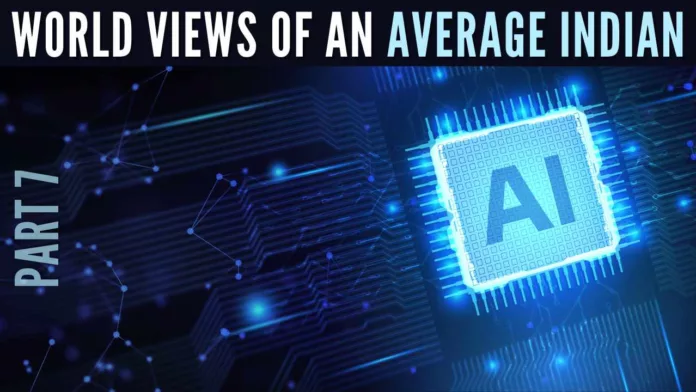
The previous 6 parts of the article can be accessed here Part 1, Part 2, Part 3, Part 4, Part 5, Part 6. This is the seventh part
How AI amplifies the lies we tell ourselves
We tell ourselves many lies. Small and big. But most often, we’re not even conscious of it.
Some of these lies are innocuous, some influence our decisions in day-to-day lives, and some change the course of nations or even the world.
Seth Godin, a renowned marketing guru, wrote a groundbreaking book, “All Marketers Are Liars”. In this book, he analyses the psychology behind effective marketing to shape consumer behavior. He contends expert marketers are adept storytellers, crafting narratives (taking liberties with truth where convenient) trying to align with consumers’ overarching world views. And in the real world, some marketers stretch these fabrications to their limits.
Consider the world of marketing that tells stories in 10 to 20-second ad form. These narratives try to etch the promoted product/ service, along with its promised benefits, into our memories.
From claims that 20 minutes can remove stubborn stains from any fabric to portraying a child willingly consuming a nutritious drink because it’s delicious, these messages, whether blatant, partial, or tongue-in-cheek lies, seep into our subconscious and influence our purchasing decisions through repeated exposure.
Beyond external influences, we also deceive ourselves, often falling victim to our own fabrications.
We form instantaneous, stereotypical world views about people based on arbitrary criteria like appearance, clothing, education, or origin. These stereotypes frequently guide our personal and business transactions and decisions, even when facts suggest otherwise.
When confronted with our mistakes, whether personal or professional, we often defend ourselves without fully grasping all the relevant facts.
In political discussions, we passionately support or criticize a party or leader without having a complete understanding of the issue at hand.
During conversations, we speak with unwarranted authority, failing to preface our statements with necessary caveats and relying on assumptions.
All these lies collectively shape our world views.
What does artificial intelligence (AI) have to do with these lies and our world views?
AI, an offspring of natural intelligence (NI), cannot surpass the cognitive capabilities of NI. However, AI benefits from the aggregated intelligence of multiple individuals involved in the project, thus surpassing the limitations of any individual’s NI.
Human errors, resulting from assumptions, oversight, and constraints in mathematical and logical thinking, are inherent to NI but are minimized in AI. Cloud computing empowers AI, making it more potent than its human counterpart. The reason why computers are now able to defeat even the world chess champion.
Nevertheless, AI operates within the parameters set by humans, solving problems defined by humans. So, AI is enhanced NI.
The potential for AI to autonomously formulate and solve problems raises ethical concerns and potential consequences. Concerned governments, organizations, and individuals are actively exploring ways to regulate AI, preventing its misuse against humanity and the broader universe. However, it appears that no one can restrain the exponential growth of AI.
Understanding NI is crucial to comprehending AI. NI involves humans processing facts, assumptions, and perspectives as data, employing human-developed algorithms infused with fuzzy logic to arrive at decisions. In essence, AI magnifies the strengths and biases inherent in NI, as biases embedded in data and algorithms inevitably influence AI outcomes.
Many believe that AI will usher in an era of superior decision-making. The expectation is that, based on the amalgamated expertise of many cross-functional experts, and information taken from extensive databases, AI will gradually minimize errors and biases, improving the quality of its results over time.
AI users determine which AI tools they want to use. Those with liberal world views are likely to use AI tools generated by liberal ecosystems, while conservatives and adherents of different religions or nationalities will choose tools aligning with their respective world views. As AI tools can even be customized at an individual level, over time, they may reflect our individual ways of thinking.
Just as with our personal deceptions, some of the inaccuracies within AI systems will be inconsequential, while others will significantly impact our daily decisions or even alter the course of a nation or geopolitical history.
AI tools will be used extensively in the forthcoming 2024 Lok Sabha polls in India, by both the BJP and the opposition parties. Elections are also due in 2024 in about 40 countries including the US and Israel. The impact of AI on these elections remains uncertain, but as AI’s growth becomes exponential in the subsequent years, its influence will likely be huge.
Likewise, AI tools will be extensively utilized directly and indirectly in conflicts and wars between nations, ideologies, religions, and civilizations.
As the adoption of AI increases, a diverse array of AI tools will emerge, ranging from unbiased to neutral and biased, and even customized variants for individuals. The outcomes, whether unbiased or biased, will hinge on the AI tools selected, mirroring decision-making patterns rooted in natural intelligence but on an amplified scale.
Caveat: While AI magnifies the negatives of NI, it also enhances the positives. However, this article focuses solely on how AI amplifies the lies we tell ourselves and does not delve into the positive aspects.
Note:
1. Text in Blue points to additional data on the topic.
2. The views expressed here are those of the author and do not necessarily represent or reflect the views of PGurus.
For all the latest updates, download PGurus App.
- How BJP can get 33%+ vote share in TN - April 1, 2024
- A transparent, equitable electoral funding alternative - March 19, 2024
- How TN BJP can come to No. 1 or No. 2 in 2024 LS polls - January 11, 2024










